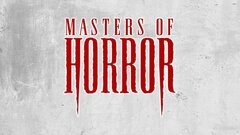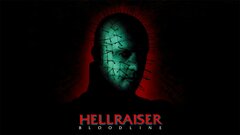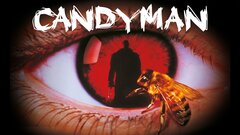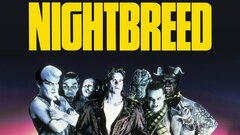Clive Barker

Writer • Director • Producer • Actor • Artist • Comic Book Writer
Birth Date: October 5, 1952
Age: 71 years old
Birth Place: Liverpool, England, UK
Once hailed by Stephen King as the future of horror, author Clive Barker parlayed his success as a prose writer into a wide range of mediums, including films, visual arts and even video games. Barker was a true innovator in the horror genre, thanks in large part to his higher literary ambitions. But perhaps his greatest talent was his ability to cleverly recycle the old formulas with sexuality and over-the-top violence. By the mid-1990s, with a slew of best-selling novels, short story collections and comic book series bearing his name, the workaholic Barker was also a well-established presence in Hollywood, having written and directed the popular "Hellraiser" (1987), which spawned a long-running cult franchise that saw several theatrical and direct-to-DVD releases over the ensuing decades. Though occasionally stepping behind the camera for the likes of "Nightbreed" (1990) and "Lords of Illusion" (1995), Barker served more as an executive producer on a number of films, most of which were adapted from his novels and short stories. With his name attached to such horror fare as "Candyman" (1992) and "Hellraiser: Bloodlines" (1995), it came as a surprise to some when he executive produced the award-winning drama "Gods and Monsters" (1998), which focused on openly gay horror director James Whale. While delving into young adult novels on "The Books of Aharat" series and adult titles like "The Midnight Meat Train" (2008), Barker remained a thoughtful and articulate practitioner of the horror genre.
Born on Oct. 5, 1952 in Liverpool, England, Barker was raised in a blue collar home by his father, Len, a personnel director for an industrial relations firm, and his mother, Joan, a social welfare officer who spent much of her spare time as a painter. When he was 14 years old, Barker came to the realization that he wanted to scare people for a living after watching Alfred Hitchcock's "Psycho" (1960). While in Quarry Bank School - the same high school attended by John Lennon - Barker escaped his rather humdrum existence by writing, directing and performing in plays. He later studied literature and philosophy at Liverpool University, after which he moved to London and founded the experimental theatre troupe, Dog Company. Over the next eight years, Barker lived on the dole while putting on plays like "Dog" (1978), "The History of the Devil" (1980) and "Frankenstein in Love" (1980). After the troupe disbanded, he began writing horror short stories like "The Midnight Meat Train," "The Skins of the Fathers" and "Pig Blood Blues" which were printed in 1983 by a small publisher and released to little success. When published in the U.S. as The Books of Blood, the stories featured a blurb on the jacket from none other than Stephen King, who wrote "I have seen the future of horror and its name is Clive Barker." Thanks to that one line, sales of the volume surged. Without it, Barker's career might never have been.
After King's fortuitous quotation, Barker remained one of the top practitioners of gruesome and literate horror and fantasy novels, while branching out into writing and directing motion pictures. Soon he published his first full-length novel, The Damnation Game (1985), which featured ruminations on such light-hearted topics as incest, cannibalism and self-mutilation. Following his first step into fantasy fiction, Weaveworld (1987), Barker realized his goal of making horror films that would take themselves seriously, as opposed to the campy, tongue-in-cheek fare that dominated the genre throughout the decade. He made his feature debut as a director with "Hellraiser" (1987), adapted by Barker from his novella The Hellbound Heart (1987), which focused on a man trapped in hell (Sean Chapman) who uses his old lover (Clare Higgins) and his brother (Andrew Robinson) to escape by means of an intricate puzzle box that releases a menagerie of demons. Made on a shoestring budget of $1.5 million, "Hellraiser" grossed more than $30 million at the box office, while introducing the affectionately nicknamed Pinhead (Doug Bradley) into the pantheon of classic horror villains.
Barker returned as an executive producer for "Hellbound: Hellraiser II" (1988) and "Hellraiser III: Hell on Earth" (1992), both of which displayed diminished quality as compared to the original. Still, they proved strong enough at the box office to warrant further sequels throughout the decades, though Barker had little to do with their production. Though he received a story credit for the first sequel and a from characters credit on the subsequent entries, Barker had no control over his creation because he sold the rights for $1 million in a deal that had allowed him to direct the first installment. Back to writing fiction, Barker began moving further away from horror into the fantasy realm with The Great and Secret Show (1989), while also delving into children's novels with The Thief of Always (1992), which featured 27 of his own illustration and sold a whopping 500,000 copies. In between, he delivered his sophomore effort as the writer-director of the uneven, but intriguing "Nightbreed" (1990), adapted from his story "Cabal," in which fellow horror auteur David Cronenberg had a role as a sinister psychiatrist who frames a patient (Craig Sheffer) for murder.
Far better was "Candyman" (1992), a genuinely creepy and original story of urban folklore which Barker executive produced and penned with his original story, "The Forbidden." Adapted and Americanized by writer-director Bernard Rose, "Candyman" received the strongest notices of any Barker-related film up to that point and beyond. Of course, the film spawned an inferior sequel, "Candyman: Farewell to the Flesh" (1995), for which Barker secured executive producer and story credits. While continuing to churn out novels like Everville (1994), the second of his long-unfinished Art Trilogy, and the Yorkshire-set fantasy Sacrament (1996), Barker returned to the director's chair for "Lord of Illusions" (1995), an unusual film noir about how real and deadly magic can sometimes fuel the art of illusion. Barker also served as producer and adapted his 1985 story "The Last Illusion" for the gory special effects-driven movie which opened to mixed reviews and moderate box office. Returning to the series that launched his film career, he served as an executive producer on "Hellraiser: Bloodlines" (1995), which introduced the old sci-fi canard of time travel to the horror proceedings, only to result in a choppy movie devoid of coherent storytelling.
Barker took a sharp turn away from horror and fantasy to serve as an executive producer on "Gods and Monsters" (1998), a speculative drama about the waning years in the life of horror director, James Whale, who helmed such classics as "Frankenstein" (1931), "The Invisible Man" (1933) and "The Bride of Frankenstein" (1935), while living as an openly gay man - practically unheard of for the times. An openly gay man himself, Barker had a personal connection to the story as well as a professional one. Noted for its exquisite performances from Ian McKellen, Brendan Fraser and Lynn Redgrave, "Gods and Monsters" was a decidedly different film to which Barker attached his name. Continuing along in that vein, he made his off-Broadway playwriting debut with "Subtle Bodies" (1998), while delving into the young adult market with his fantasy series, "The Books of Abarat," starting in 2002 with Abarat. After serving as the producer on the straight-to-DVD horror release, "The Plague" (2006), Barker produced the adaptation of his old short story, "The Midnight Meat Train" (2008), which focused on a struggling photographer (Bradley Cooper) who finds the perfect subject in a brutal serial killer (Vinnie Jones), only to find himself and his girlfriend (Leslie Bibb) corrupted and pulled into darkness. He next produced "Dread" (2010), a psychological horror thriller based on his own short story about three college students who study people's fears for a documentary class, only to force their subjects intro directly confronting their worst fears. Meanwhile, Barker underwent successful surgery to remove polyps from his throat after a lifetime of chain smoking cigars, which he previously quit following two other surgeries the prior year.
Credits

HellraiserStream

Books of BloodStream

The Last Drive-in With Joe Bob BriggsStream

JoJo Baby

Dread

The Midnight Meat TrainStream

Clive Barker's Book of Blood

Masters of HorrorStream

Gods and MonstersStream

Hellraiser: BloodlineStream

Candyman: Farewell to the Flesh

Candyman: Farewell to the Flesh

Lord of Illusions

Lord of Illusions

Lord of Illusions

SleepwalkersStream

Hellraiser III: Hell on EarthStream

Hellraiser III: Hell on EarthStream

CandymanStream

CandymanStream

NightbreedStream

NightbreedStream

NightbreedStream

HellraiserStream

HellraiserStream

Rawhead Rex

Transmutations

Salome

Salome



